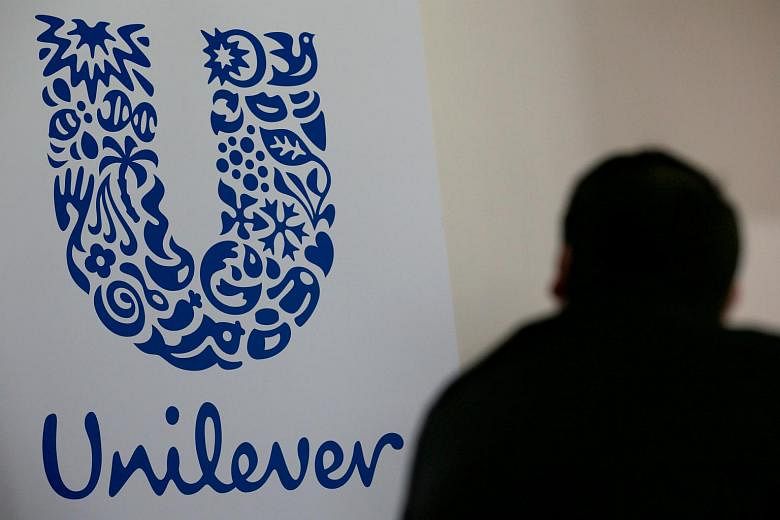WASHINGTON - One of the world's largest advertisers is threatening to pull its ads from social sites, such as Facebook and YouTube, if the tech companies do not do more to minimise divisive content on their platforms.
Unilever's chief marketing officer Keith Weed called on Silicon Valley on Monday (Feb 12) to better police what he describes as a toxic online environment where propaganda, hate speech and disturbing content that exploits children thrive, The Washington Post reported.
"Fake news, racism, sexism, terrorists spreading messages of hate, toxic content directed at children - parts of the Internet we have ended up with is a million miles from where we thought it would take us," Mr Weed said in a speech at the Interactive Advertising Bureau's Leadership Meeting in Palm Desert, California.
"It is in the digital media industry's interest to listen and act on this," he said.
Last year, Unilever spent nearly US$9.5 billion (S$12.6 billion) marketing its brands, including Dove, Lipton tea, Axe, and Ben & Jerry's ice cream. One quarter of that budget, or about US$2.4 billion, was spent on digital advertising, according to The Washington Post.
Mr Weed said that the company promises to boost more "responsible content" including ads that tackle gender stereotypes, and will only partner with digital networks that pledge to use an industry standard for ad metrics and improve consumer ad experiences.
Mr Weed said he has already begun discussions with Facebook, Google, Twitter, Amazon.com and Snap. Amazon.com chief executive Jeff Bezos also owns The Washington Post.
"(I)t is acutely clear from the groundswell of consumer voices over recent months that people are becoming increasingly concerned about the impact of digital on well-being, on democracy - and on truth itself," Mr Weed said. "This is not something that can be brushed aside or ignored. Consumers are also demanding platforms which make a positive contribution to society."
Google and Facebook, the two Web companies that dominate online advertising, have come under heightened pressure from lawmakers, academics and industry critics to invest more heavily in filtering out misinformation and abusive content on their networks, according to The Washington Post.
Last year, Google's YouTube faced a backlash from US advertisers who said the company was not doing enough to prevent their ads from being played alongside derogatory and extremist content. Google has since adopted changes to its YouTube platform, which draws 1.6 billion monthly users. Those changes include stricter criteria for what types of videos can receive ad dollars and more human reviewers of content.
In response to Mr Weed's message, Google said that it takes its partners and users' trust and safety seriously.
"We will continue to work to earn that trust every day," Google said, according to The Washington Post.
Facebook chief executive Mark Zuckerberg announced earlier this year that the social network's News Feed would show its 2.1 billion users more posts from their friends and family, as opposed to news organisations and brands, in an effort to generate more meaningful interactions.
During Facebook's most recent earnings call, Mr Zuckerberg acknowledged that users spent 50 million hours less per day on the social network than during the previous quarter, in part because they see fewer viral videos - a consequence of Facebook's new push to prioritise the quality of interactions on its platform over the popularity of content.
The last two years have been the most difficult for Mr Zuckerberg, according to tech magazine Wired. In its March 2018 cover story, interviews with 51 current and former Facebook employees revealed that the company has been plagued by several challenges including fake news as well as accusations that the Facebook platform might have been used for election meddling.
The magazine said that the CEO, whose techno-optimism has been crushed, "truly cares that his company fix the problems swirling around it".
"This whole year has massively changed his personal techno-optimisim. It has made him much more paranoid about the ways that people could abuse the thing that he built," one executive told Wired.
According to eMarketer's latest estimates, Google and Facebook are expected to claim nearly two-thirds of the US market share for digital ads. Google is expected to command 42 per cent of the market, with Facebook at 23 per cent.
Mr Weed said that 2018 "is either the year of techlash, where the world turns on the tech giants - and we have seen some of this already - or the year of trust, the year where we collectively rebuild trust back in our systems and our society".
Facebook said in a statement: "We fully support Unilever's commitments and are working closely with them."

